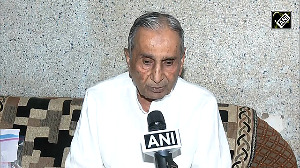Is an inflation rate of 6.8 percent bad news for India when countries like Zimbabwe have hyper-inflation of 100,000 percent?
In 1981 we had an inflation rate of 10.4 percent when GDP growth was over six percent. In 1991, inflation was as high as 13.1 when GDP growth was just one percent. Why are the common man and the policy makers worried about inflation?
This brings us to the definition of inflation? A common man understands that there is inflation when he buys his usual list of commodities from the market. If there is an appreciable increase in prices, there is indeed inflation and the media is already full of such bad news.
A simple definition of inflation is an increase in prices and or decline in purchasing power. However over the years, the definition of inflation has undergone a change.
According to the Webster's New Universal Unabridged Dictionary published in 1983 the second definition of 'inflation' after 'the act of inflating or the condition of being inflated' is:
"An increase in the amount of currency in circulation, resulting in a relatively sharp and sudden fall in its value and rise in prices: it may be caused by an increase in the volume of paper money issued or of gold mined, or a relative increase in expenditures as when the supply of goods fails to meet the demand."
So this broader definition focuses on money supply. If there is more money supply, it causes an increase. So inflation is a cause rather than effect.
The American Heritage Dictionary of the English Language, 2000 (4th Edition) defines it more broadly: a persistent increase in the level of consumer prices or a persistent decline in the purchasing power of money, caused by an increase in available currency and credit beyond the proportion of available goods and services.
In this definition, inflation would appear to be the consequence or result (rising prices) rather than the cause.
So between 1983 and 2000 the definition appears to have shifted from the cause to the result. Also note that the cause could be either an increase in money supply or a decrease in available goods and services.
What if there is no inflation? We have observed
In India, inflation is a political issue but a lower inflation rate does not guarantee success in elections which the Congress government learnt in 1996 when the rate climbed down to 6.5 percent as against 13 percent in 1991.
However, political parties need to go by public sentiments, which are often against a rising inflation.
Look at the official reactions. Finance Minister P Chidambaram in Singapore blamed US for creating commodity inflation by diverting food crops for bio-fuel and also creating global financial uncertainties by sub-prime lending.
At the same time he announced in the Budget that the country is going to have a record output of food grains this year. So where are the bottlenecks really?
It could be the rising oil prices both edible oil and crude oil or some other global trends over which the FM or RBI has no control. So the question why have a tight monetary policy?
In terms of action also the government cannot be blamed -- it has made exports difficult by raising the minimum export prices of essential commodities and imports by reducing duty on edible oils.
T Nanda Kumar, Secretary, Food, Consumer Affairs and Public Distribution said in an interview that supply side bottlenecks for essential commodities are being addressed.
From the technical point of view, inflation now is different from inflation experienced before because of high foreign exchange reserves that put pressure on rupee to appreciate.
These are tough times for the industry and policy makers then. For the industry, productivity gains have to be long enough to compensate the rising rupee and inflation levels that make them uncompetitive, according to an analyst.
History shows that high inflation rates could correct itself over a period of time through a combination of market forces and government regulation. Or perhaps it is god's way of letting people know the value of money.






 © 2025
© 2025